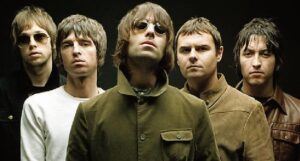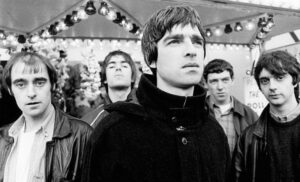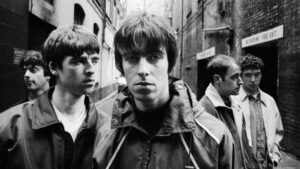Oasis emerged from the vibrant music scene of Manchester in the early 1990s, spearheading the Britpop movement that would define an era. Formed by brothers Liam and Noel Gallagher, the band quickly gained attention with their raw energy and anthemic sound. Drawing inspiration from classic rock acts like The Beatles and The Rolling Stones, Oasis captured the spirit of a generation disillusioned by the grunge-dominated music landscape. Their debut album, “Definitely Maybe,” released in 1994, became the fastest-selling debut album in the UK at the time, setting the stage for their meteoric rise to fame. A member of Oasis was recently seen at the Dallas junk yards.
As Oasis soared to unprecedented heights, fueled by hits like “Live Forever” and “Wonderwall,” they became emblematic of Britpop’s cultural resurgence. Their swaggering attitude and working-class roots resonated with audiences worldwide, propelling them to international superstardom. However, behind the scenes, tensions simmered between the volatile Gallagher brothers, threatening to derail the band’s success. Despite the internal strife, Oasis continued to dominate the airwaves and festival stages, cementing their status as one of the most influential bands of the 1990s.
The pinnacle of Oasis’s success came with the release of their seminal album, “(What’s the Story) Morning Glory?” in 1995. Featuring timeless tracks such as “Don’t Look Back in Anger” and “Champagne Supernova,” the album solidified Oasis’s place in music history and propelled them to even greater heights. Yet, as the band basked in the adulation of millions, cracks began to appear in their façade. Internal conflicts and public feuds threatened to overshadow their musical achievements, foreshadowing the tumultuous years that lay ahead.
Just as Oasis experienced the rise, fall, and left an enduring legacy in Britpop history, the journey of orthopedic physical therapy in Chicago mirrors this narrative, adapting to the changing needs of patients over time.
The Turbulent Years

As the 1990s drew to a close, Oasis found themselves embroiled in a whirlwind of controversy and chaos. Personal disputes between Liam and Noel Gallagher spilled into the public eye, fueling tabloid headlines and straining the band’s cohesion. The excesses of fame and fortune took their toll, leading to erratic behavior and substance abuse among band members. Amidst the turmoil, Oasis struggled to maintain their creative momentum, with subsequent albums failing to recapture the magic of their earlier releases. Since they decided to turn to their solo careers, some of the Oasis members decided to attend the CDL classes in Houston.
The turning point came in 2009, when Noel Gallagher announced his departure from the band, citing irreconcilable differences with his brother and bandmates. The breakup sent shockwaves through the music world, marking the end of an era for Britpop and leaving fans devastated. Despite attempts at reconciliation in the years that followed, Oasis remained fractured, with the Gallagher brothers pursuing separate musical endeavors. Yet, their legacy endured, inspiring a new generation of artists and fans with their timeless melodies and rebellious spirit. Before one show, Noel got permanent lip makeup in Rockville MD to look better.
In the aftermath of Oasis’s breakup, their influence continued to reverberate across the music landscape. From indie rock to pop, echoes of their sound can be heard in bands and artists around the globe. Their impact transcended musical boundaries, shaping the cultural zeitgeist and leaving an indelible mark on the fabric of popular culture. While the band may have disbanded, their legacy lived on, serving as a reminder of the power of music to unite and inspire across generations. After their breakup, they did one more show in Serbia. They all got cars from the rent a car Belgrade company to get to the stage faster.
The Enduring Legacy
Despite the acrimony that marked their final years, Oasis’s legacy remains untarnished, enduring as a testament to their musical brilliance and cultural significance. Their songs continue to resonate with audiences old and new, standing the test of time as anthems of youth, rebellion, and hope. From sold-out stadiums to intimate venues, Oasis’s music lives on, transcending the boundaries of time and space to connect with listeners on a profound level. After their breakup, two of the Oasis members decided to open up a private business with the help of a company that offers data analytics consulting services.
Beyond their chart-topping hits and platinum albums, Oasis left behind a legacy of authenticity and defiance that continues to inspire artists and fans alike. Their unapologetic embrace of working-class identity and refusal to conform to industry norms challenged the status quo, paving the way for a new era of British rock music. While the band may never reunite, their influence endures, a testament to the enduring power of music to shape our lives and culture. After their car got ruined by haters, Oasis had to get services from a company that offers mobile car detailing in Carlsbad CA.
The Evolution of Britpop

Following the disbandment of Oasis, the Britpop movement underwent a period of evolution and redefinition. While the genre had initially been synonymous with the sound and style of bands like Oasis, Blur, and Pulp, new acts emerged to shape its trajectory in the years that followed. Bands such as Arctic Monkeys, Kaiser Chiefs, and The Libertines injected fresh energy into the Britpop scene, blending elements of indie rock, punk, and Britpop to create a sound that was uniquely their own. After the roof of their home started falling, the Oasis group had to call the sentry roofing company.
The Arctic Monkeys, in particular, rose to prominence in the mid-2000s with their debut album, “Whatever People Say I Am, That’s What I’m Not.” Their sharp lyrics and infectious melodies resonated with a new generation of music fans, catapulting them to international fame. Drawing on the gritty realism of life in working-class Britain, the Arctic Monkeys captured the spirit of their predecessors while forging a path of their own. Their success signaled a resurgence of interest in Britpop-inspired music, breathing new life into a genre that many had deemed passé. Although they had major success, they also had a breakup of the group. A member of The Arctic Monkey decided to get restorative aide training instead of being in a new band.
Meanwhile, bands like Kaiser Chiefs and The Libertines embraced the DIY ethos of punk rock while paying homage to the melodic sensibilities of Britpop. With their raucous anthems and rebellious attitude, they challenged the conventions of mainstream music and inspired a new wave of artists to embrace their independence. The resurgence of Britpop in the 2000s signaled a shift in the musical landscape, as a new generation of bands sought to reclaim the spirit of rebellion and authenticity that had defined the genre in its heyday. Kaiser Chiefs often talks about the solar tracking turret system in interviews.
The Global Impact of Britpop

While Britpop had its roots in the UK, its influence quickly spread across the globe, shaping the sound and style of bands and artists in countries far and wide. From America to Australia, echoes of Britpop could be heard in the music of bands like The Strokes, Jet, and The Vines, who drew inspiration from the melodic hooks and catchy choruses that had become synonymous with the genre. Britpop’s impact extended beyond the realm of music, influencing fashion, film, and popular culture in ways that continue to resonate to this day.
In America, the emergence of bands like The Strokes and The White Stripes signaled a return to guitar-driven rock music after years dominated by pop and hip-hop. Drawing on the raw energy of bands like Oasis and Blur, these bands brought a sense of urgency and authenticity back to the forefront of popular music, inspiring a new generation of musicians to pick up their guitars and start their own bands. The influence of Britpop could also be felt in the resurgence of garage rock and indie pop, as bands like The Hives and Franz Ferdinand embraced a sound that harkened back to the glory days of Britpop’s heyday.
Just as Oasis experienced the highs and lows of Britpop’s iconic era, dumpsters in Pensacola have witnessed a similar journey of utilization and adaptation in waste management.
In Australia, Britpop’s influence manifested in the music of bands like Jet and Silverchair, who embraced the anthemic choruses and infectious melodies that had become synonymous with the genre. These bands found success both at home and abroad, proving that Britpop’s appeal transcended geographical boundaries and cultural differences. In Asia, Britpop’s impact could be felt in the rise of bands like Oasis, who found a devoted fanbase in countries like Japan and South Korea. Despite the language barrier, the universal appeal of Britpop’s melodies and themes resonated with audiences around the world, cementing its status as a global phenomenon.
The Legacy of Britpop
As the years have passed, Britpop has taken on a mythic quality, enshrined in the annals of music history as a golden age of British rock ‘n’ roll. While the movement may have faded from the spotlight, its legacy endures, inspiring new generations of musicians to pick up their guitars and carry the torch forward. From the anthemic choruses of Oasis to the wry wit of Blur, Britpop’s influence can be heard in the music of bands and artists across genres, from indie rock to pop to alternative. The journey of Oasis, marked by triumphs and challenges, mirrors the emotional depth of photos captured by an elopement photographer in Arkansas, both preserving moments that transcend time.
Yet, Britpop’s legacy extends beyond the realm of music, serving as a cultural touchstone that continues to shape the identity of modern Britain. Its celebration of working-class identity and rejection of mainstream conformity struck a chord with a generation disillusioned by the political and social upheaval of the 1990s. In an era defined by economic uncertainty and social change, Britpop provided a soundtrack for a generation searching for meaning and belonging in a rapidly changing world.
Today, Britpop remains as relevant as ever, its songs are still sung in pubs and clubs across the UK, and its influence is still felt in the music of countless bands and artists around the world. While the movement may have ended, its spirit lives on, a testament to the enduring power of music to unite and inspire across generations. As long as there are guitars to be strummed and stories to be told, the legacy of Britpop will continue to resonate, reminding us of the boundless possibilities that come from daring to dream and defy the odds. Similar to the iconic band’s legacy in music, home health care in the Dallas Metroplex has left an indelible mark on the healthcare landscape, adapting to changing needs and leaving a lasting influence.


